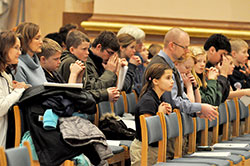Archdiocesan offices of pro-life and family life ministries merge, as ‘pro-life efforts integrated into work of families’

Students and teachers of Lumen Christi Catholic School in Indianapolis kneel in prayer during the Jan. 22 Mass at SS. Peter and Paul Cathedral that commemorated the 41st anniversary of the Roe v. Wade and Doe v. Bolton U.S. Supreme Court decisions that legalized abortion across the country. The Church in the U.S. now observes the date as the Day of Prayer for the Legal Protection of Unborn Children. The archdiocesan Office of Pro-Life and Family Life coordinates the Mass and local March for Life that follows the liturgy. (File photo by Sean Gallagher)
By Natalie Hoefer
When Rebecca Niemerg was hired by the archdiocese last summer, she was challenged with many tasks.
“One thing I was commissioned to do was to combine the offices of Pro-Life Ministries and Family Life Ministries into one Office of Pro-Life and Family Life,” she said.
She is moving forward with that mission, and not just out of obligation.
“I think that it really makes a lot of sense, if you consider that it’s within a family, hopefully, that we come to know our own dignity and who God is,” said Niemerg, who serves as director of the archdiocesan Office of Pro-Life and Family Life. (Related: Events and ministries of the archdiocesan Office of Pro-Life and Family Life)
“It is in that context that we come to know that truth about ourselves and about others.
“It’s only when we know our own dignity that we can give ourselves fully in a vocation, whether that is religious life, married life or fully given as a single person. I think that the wisdom of combining those two areas really flows and makes sense.”
‘My goal now is…’
Niemerg has spent her time in the archdiocese coordinating the combining of the two offices of pro-life and family life ministries. While that effort is moving forward, she is ready to go out to the parishes and start talking with people.
“My goal now is to find out what it is that people need so that we can serve them well. What are the needs of the parishes? What do people need to be good parents and form good bonds with their families? How do they teach their children about their own dignity?”
Niemerg seeks to help parishes form a pro-life committee if they do not have one, and to help existing parish pro-life committees.
Pro-life is integrated with families
To accomplish this, she draws greatly from material provided by the U.S. Conference of Catholic Bishops (USCCB).
“The USCCB has a document called the ‘Pastoral Plan for Pro-Life Activities,’ ” Niemerg explained. “They outline the four areas that parish pro-life committees and offices of pro-life should focus on: pastoral care, information/education, public policy and prayer and worship.
“There are many things that fall under both pro-life and family life,” she explained. “For example, health care falls under education and information, but it also falls under pastoral care.
“So if you read that [document], you can see that even as the bishops speak about pro-life efforts, how much it is integrated into the work of families,” she said.
‘Dignity of the whole person’
Niemerg also draws upon USCCB material when suggesting parish pro-life activities.
“There are many activities that use the material in the ‘respect life’ packet [the USCCB] provides every year,” she said.
“A good beginning activity is a spiritual adoption program. The reason I recommend that is because it covers three of the four areas with one activity.
“You’re inviting parishioners to spiritually adopt a child who is in danger of being aborted, so you’re covering prayer,” she said.
“It’s informational and educational because, as part of the program, parishes are invited once a month to share information on the development of the unborn child.
“The ending of the program is normally a baby shower, so you donate those items to Birthline, a local pregnancy care center or the Gabriel Project. So there’s pastoral care,” she explained.
That is just one activity covering one aspect of pro-life ministry. Niemerg emphasized the diversity in topics covered by packets of pro-life material distributed by the USCCB every year.
“Domestic violence, hope and healing after an abortion, pregnancy after rape, religious freedom, what does our culture look like after the institution of abortion, end-of-life issues,” she said, rifling through the brochures in the packet. “Parish pro-life committees are concerned about the dignity of the whole person, from conception to natural death.”
‘A leaven within society’
Between the many ministries offered by the Office of Pro-life and Family Life (see article below) and reaching out to parishes in regard to these areas, Niemerg hopes to make families and the Church a “leaven within society.”
“There are times when we don’t come to know [God’s love] in our family,” she said. “That’s when the rest of the Catholic community needs to step forward and be that fatherly figure or motherly figure of Mary.
“But the family is the fundamental unit of society. The Church doesn’t work against society—we are a part of and a leaven within society.
“The family is called the domestic Church. We need to live that faith first in our family, so we can live it out in our Church community and out in the world.” †
